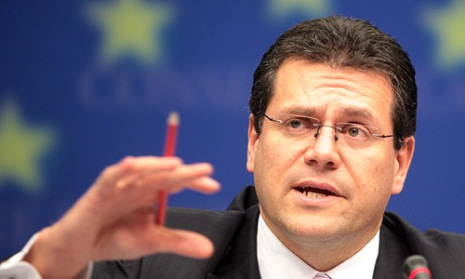Azerbaijan, EU step up Southern Gas Corridor efforts

On February 12, the first meeting of the advisory council for the Southern Gas Corridor will be held in Baku, Azerbaijan, an important alterative supplier for the EU, the head of Azerbaijan’s Mission to the EU told New Europe.
“In Baku it will be February 12,” Azerbaijan’s Ambassador to Brussels Fuad Isgandarov said on January 27. “Azerbaijan has already confirmed that we’re ready to organise it.”
There has been an increased effort from Azerbaijan and the EU to move the Southern Gas Corridor project along faster, Isgandarov said. “It’s very important. The idea is to have such kind of meetings on permanent basis and that is the first meeting to discuss and to find a solution of the problems with the implementation of the Southern Gas Corridor. For us it is important to have a roadmap confirmed by all the participants for implementation of our Southern Gas Corridor,” he said, adding that the project includes exploration of the huge Azeri Shah Deniz 2 field, the Trans Anatolian Pipeline (TANAP) and the Trans Adriatic Pipeline (TAP).
Isgandarov reminded that the meeting has already been confirmed by European Commission Vice President for Energy Union Maros Sefcovic, whom he will accompany to Baku. The ministers of energy from countries that have been included in the Southern Gas Corridor, the main operators of the project, including BP and Azeri state oil company SOCAR, and high-level EU officials are expected to participate. “It will be a very serious meeting; the first meeting of the advisory council for the Southern Gas Corridor,” he said.
Three days earlier, on February 9, energy ministers from the region will meet for talks in Sofia, Bulgaria.
The EU needs to assess the state of play of the European energy policy and to identify the necessary new paths to ensure the desired European integration. By the end of February, the European Commission will propose the strategy and the roadmap towards the European Energy Union, along with a roadmap to Paris and a communication on the achievement process, Sefcovic said on January 21 in a meeting with the Members of the European Parliament in the Industry, Research and Energy committee. It will also present a draft plan for building pipelines between EU member states. Such interconnectors will allow gas to be shipped between countries, similar to what Slovakia and Hungary have been doing for Ukraine, and cut individual states’ dependence on single suppliers to supply routes.
Meeting in Davos last week, Azerbaijani President Ilham Aliyev and Sefcovic highlighted stressed the importance of the increasing role of Azerbaijan in ensuring the energy security of Europe, and the significance of the Southern Gas Corridor in this regard. The sides discussed the issues related to the meeting on the Southern Gas Corridor to be held in Baku and exchanged views on the current state and prospects of cooperation.
The EU is intensifying efforts to come up with a strategy to ensure energy supplies to southeast European countries, especially after Russian President Vladimir Putin announced in December that Moscow was dropping plans to build the South Stream gas pipeline through the Black Sea to Bulgaria, citing disagreement with Brussels over the project. Instead, the Kremlin said, Russian gas monopoly Gazprom would pursue an alternative transit route, dubbed and Greece. Balkan countries, especially Bulgaria rely heavily on Russian gas and the transit of the Russian blue fuel through Ukraine.
Sefcovic has dismissed suggestions from Gazprom CEO Alexei Miller following a meeting between the two in Moscow on January 14 that the EU needed to start building pipelines to the Turkish-Greek border “today” if it wanted to receive Russian gas beyond 2019, when the company’s contract with Ukraine expires. “[South Stream] is closed. The Turkish Stream is the sole route. There are no other options,” Miller said at the time. For his part Sefcovic said that “I believe we can find a better solution”. “We don’t work like this … the trading system and trading habits - how we do it today - are different.”














































